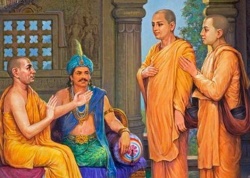Difference between revisions of "Mahā Udāyi"
(Created page with "</poem> 1. Udayi Thera - Also called Laludayi (and Pandita Udayi), to distinguish him from others. - He was the son of a brahmin of Kapilavatthu. He s...") |
|||
| (5 intermediate revisions by the same user not shown) | |||
| Line 1: | Line 1: | ||
| − | + | [[File:039eb.jpg|thumb|250px|]] | |
| − | |||
| − | |||
| − | |||
| − | Elsewhere (S.v.86ff) [[Udayi]] is mentioned as asking the [[Buddha]] to instruct him on the [[bojjhangas]], and once, at Desaka (Setaka?) in the Sumbha country, he tells the [[Buddha]] how he cultivated the [[bojjhangas]] and thereby attained to final [[emancipation]] (S.v.89). | + | |
| + | |||
| + | |||
| + | |||
| + | <poem> | ||
| + | 1. [[Udayi Thera]] - Also called [[Laludayi]] (and [[Pandita Udayi]]), to distinguish him from others. - He was the son of a [[brahmin]] of [[Kapilavatthu]]. He saw the [[power]] and majesty of the [[Buddha]] when the [[latter]] visited his kinsmen and, entering the [[Order]], in due course became an [[arahant]]. When the [[Buddha]] {{Wiki|preached}} the [[Nagopama Sutta]] (see A.iii.344f), on the [[occasion]] when Seta, [[King]] [[Pasenadis]] [[elephant]], was publicly admired, [[Udayi]] was stirred to [[enthusiasm]] by [[thoughts]] of the [[Buddha]] and uttered sixteen verses, extolling the [[virtues]] of the [[Buddha]], comparing him to a great and wondrous [[elephant]]. (Thag.vv.689-704; ThagA.ii.7f.; [[Udayis]] verses are repeated in the [[Anguttara]] (iii.346-7) but the Commentary (ii.669) [[attributes]] them to [[Kaludayi]]). | ||
| + | [[File:P1060150.jpg|thumb|250px|]] | ||
| + | Once when [[Udayi]] was staying at Kamanda, in Todeyyas [[mango grove]], he converted a pupil of a [[brahmin]] of the [[Verahaccani]] {{Wiki|clan}} and, as a result, was invited by [[Verahaccani]] herself to her house. It was only on his third visit to [[Verahaccani]] that [[Udayi]] {{Wiki|preached}} to her and she thereupon became a follower of the [[Faith]] (S.iv.121-4). | ||
| + | |||
| + | The [[Samyutta Nikaya]] (iv.166f.; another [[discussion]] with [[Ananda]] is mentioned in A.iv.426f) also records a [[conversation]] between [[Udayi]] and [[Ananda]], when [[Udayi]] asks if it is possible to describe the [[consciousness]], too, as {{Wiki|being}} without the [[self]]. On another [[occasion]] [[Udayi]] has a [[discussion]] with [[Pancakanga]] on [[vedana]] (M.i.396ff; S.iv.223-4; the Commentary SA.iii.86 and MA.ii.629 here describes [[Udayi]] as [[Pandita]]). [[Ananda]] overhears their [[conversation]] and reports it to the [[Buddha]], who says that [[Udayis]] explanation is true, though not accepted by [[Pancakanga]]. | ||
| + | |||
| + | Elsewhere (S.v.86ff) [[Udayi]] is mentioned as asking the [[Buddha]] to instruct him on the [[bojjhangas]], and once, at [[Desaka]] ([[Setaka]]?) in the [[Sumbha]] country, he tells the [[Buddha]] how he cultivated the [[bojjhangas]] and thereby [[attained]] to final [[emancipation]] (S.v.89). | ||
He is rebuked by the [[Buddha]] for his sarcastic remark to [[Ananda]], that [[Ananda]] had failed to {{Wiki|benefit}} by his close association with the [[Master]]. The [[Buddha]] assures him that [[Ananda]] will, in that very [[life]], become an [[arahant]] (A.i.228). | He is rebuked by the [[Buddha]] for his sarcastic remark to [[Ananda]], that [[Ananda]] had failed to {{Wiki|benefit}} by his close association with the [[Master]]. The [[Buddha]] assures him that [[Ananda]] will, in that very [[life]], become an [[arahant]] (A.i.228). | ||
| Line 12: | Line 20: | ||
[[Udayi]] was evidently a clever and attractive preacher, for he is mentioned as having addressed large crowds, a task demanding great [[powers]], as the [[Buddha]] himself says when this news of [[Udayi]] is reported to him (A.iii.184). | [[Udayi]] was evidently a clever and attractive preacher, for he is mentioned as having addressed large crowds, a task demanding great [[powers]], as the [[Buddha]] himself says when this news of [[Udayi]] is reported to him (A.iii.184). | ||
| − | According to [[Buddhaghosa]] (DA.iii.903), it is this same [[Udayi]] ([[Maha]] [[Udayi]]) who, having listened to the [[Sampasadaniya Sutta]], is beside himself with [[joy]] at the [[contemplation]] of the wonderful qualities as set forth in that [[Sutta]], and marvels that the [[Buddha]] does not go about proclaiming them. [[Buddhaghosa]] (MA.i.526) seems to identify him also with the [[Udayi]] to whom the | + | According to [[Buddhaghosa]] (DA.iii.903), it is this same [[Udayi]] ([[Maha]] [[Udayi]]) who, having listened to the [[Sampasadaniya Sutta]], is beside himself with [[joy]] at the [[contemplation]] of the wonderful qualities as set forth in that [[Sutta]], and marvels that the [[Buddha]] does not go about proclaiming them. [[Buddhaghosa]] (MA.i.526) seems to identify him also with the [[Udayi]] to whom the [[Latukikopama Sutta]] (M.i.447ff) was {{Wiki|preached}}. |
</poem> | </poem> | ||
{{R}} | {{R}} | ||
[http://www.wisdomlib.org/definition/udayi/index.html www.wisdomlib.org] | [http://www.wisdomlib.org/definition/udayi/index.html www.wisdomlib.org] | ||
[[Category:Bahuvedaniiya Sutta]] | [[Category:Bahuvedaniiya Sutta]] | ||
Latest revision as of 20:45, 2 February 2024
1. Udayi Thera - Also called Laludayi (and Pandita Udayi), to distinguish him from others. - He was the son of a brahmin of Kapilavatthu. He saw the power and majesty of the Buddha when the latter visited his kinsmen and, entering the Order, in due course became an arahant. When the Buddha preached the Nagopama Sutta (see A.iii.344f), on the occasion when Seta, King Pasenadis elephant, was publicly admired, Udayi was stirred to enthusiasm by thoughts of the Buddha and uttered sixteen verses, extolling the virtues of the Buddha, comparing him to a great and wondrous elephant. (Thag.vv.689-704; ThagA.ii.7f.; Udayis verses are repeated in the Anguttara (iii.346-7) but the Commentary (ii.669) attributes them to Kaludayi).
Once when Udayi was staying at Kamanda, in Todeyyas mango grove, he converted a pupil of a brahmin of the Verahaccani clan and, as a result, was invited by Verahaccani herself to her house. It was only on his third visit to Verahaccani that Udayi preached to her and she thereupon became a follower of the Faith (S.iv.121-4).
The Samyutta Nikaya (iv.166f.; another discussion with Ananda is mentioned in A.iv.426f) also records a conversation between Udayi and Ananda, when Udayi asks if it is possible to describe the consciousness, too, as being without the self. On another occasion Udayi has a discussion with Pancakanga on vedana (M.i.396ff; S.iv.223-4; the Commentary SA.iii.86 and MA.ii.629 here describes Udayi as Pandita). Ananda overhears their conversation and reports it to the Buddha, who says that Udayis explanation is true, though not accepted by Pancakanga.
Elsewhere (S.v.86ff) Udayi is mentioned as asking the Buddha to instruct him on the bojjhangas, and once, at Desaka (Setaka?) in the Sumbha country, he tells the Buddha how he cultivated the bojjhangas and thereby attained to final emancipation (S.v.89).
He is rebuked by the Buddha for his sarcastic remark to Ananda, that Ananda had failed to benefit by his close association with the Master. The Buddha assures him that Ananda will, in that very life, become an arahant (A.i.228).
Udayi was evidently a clever and attractive preacher, for he is mentioned as having addressed large crowds, a task demanding great powers, as the Buddha himself says when this news of Udayi is reported to him (A.iii.184).
According to Buddhaghosa (DA.iii.903), it is this same Udayi (Maha Udayi) who, having listened to the Sampasadaniya Sutta, is beside himself with joy at the contemplation of the wonderful qualities as set forth in that Sutta, and marvels that the Buddha does not go about proclaiming them. Buddhaghosa (MA.i.526) seems to identify him also with the Udayi to whom the Latukikopama Sutta (M.i.447ff) was preached.

